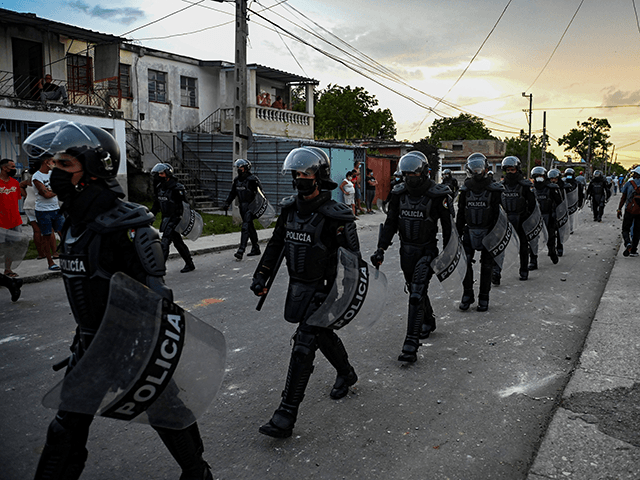Gerardo Hernández Nordelo, the head of Cuba’s “Committees for the Defense of the Revolution” (CDR), warned anti-communist dissidents at an event this week that the totalitarian regime would defend itself “at whatever price necessary.”
The CDR are grassroots espionage organizations that operate by appointing chivatos (snitches), as Cubans tend to refer to them as, on every block of every neighborhood in the country. These individuals are tasked with monitoring the speech and activities of every person living around them and notifying the communist regime if anyone appears to exhibit displeasure with the Castro family or the political system.
Hernández became the head of the CDR after President Barack Obama released him from prison in 2014. In the United States, Hernández was a member of an espionage group that came to be known as the “Cuban Five” whose operation directly led to the murder of four U.S. citizens. Hernández infiltrated an anti-communist charity in Florida known as “Brothers to the Rescue” that organized rescue flights in the Caribbean in the 1990s, meant to save wayward refugees on rafts. The Cuban military shot down four American members of the group in 1996; Hernández was the only person to serve time for their killings.
Prior to Obama’s scandalous decision to release Hernández, the Obama administration paid to ship Hernández’s sperm to Cuba so that he could sire a child with his wife while still in prison.
The Castro regime has branded Hernández a “hero of the Revolution” since his return.
The event this week was a celebration of the work of a low-level spy the regime identified as “Agent Fernando,” a self-proclaimed doctor who had allegedly infiltrated the dissident group planning a peaceful nationwide protest on November 15. “Agent Fernando” accused a dissident protest organizer, Yunier García, of seeking a violent confrontation between civilians and the Cuban military. García confirmed that he knew “Agent Fernando” and that the man had seemed suspicious at all times, leading opponents of the regime not to trust him. He also mocked the use of the term “agent” for an individual he said was more of a freelance “informant” to the regime than an official spy.
At the event on Tuesday, Hernández threatened dissident groups by asserting that the regime was unmasking “Agent Fernando” as a warning that it has so many spies in the ranks of anti-communist groups that it can afford to do so.
“They underestimate the revolutionary people who, despite the fact that we know we have problems, that we have to resolve them, we don’t want the peace that we count on in our streets to be robbed from us,” Hernández said. “[That] citizen’s calm that we have enjoyed for over 60 years … we are going to defend that at the price that is necessary.”
There are many Fernandos in this population, don’t doubt it,” he asserted.
“Fernando” delivered a brief speech in which he claimed to be a child oncologist and claimed that Cuba often runs out of chemotherapy medications “because the enemy of the north [the United States] denies it to us.” In reality, the American economic sanctions on Cuba do not cover medical or humanitarian supplies.
“The U.S. embargo allows humanitarian goods to reach Cuba, and the U.S. government expedites requests to export humanitarian or medical supplies to Cuba,” the State Department clarified this year.
Hernández awarded “Fernando” for his efforts with a giant poster of Fidel Castro.
The Cuban dissident community has largely shrugged off the big reveal. García, the protest organizer that “Agent Fernando” accused of seeking violent military action, said in a post on Facebook that he was “not surprised” the man was a chivato given his suspicious behavior.
“I frankly think they are exaggerating by calling him an ‘agent.’ For me, he was more like some sort of informant,” García said.
Another anti-communist activist, biologist Ariel Ruiz Urquiola, revealed in a livestream that he had met “Agent Fernando” while engaging in a hunger strike in 2016 to demand the regime give medical care to his sister, Omara Ruiz Urquiola, who was in need of cancer treatment. Ruiz Urquiola said that the spy approached him pretending to be a doctor concerned about his health and told him to call off the strike, asserting, “you won’t achieve anything.” Ruiz Urquiola referred to him in the livestream this week as an obvious “henchman.”
The Castro regime has escalated its violence against anti-communists and suspected enablers, including apolitical family members, in the aftermath of the July 11 protests across the island. An estimated 187,000 Cubans took the streets that day demanding freedom from communism, peacefully assembling and chanting slogans against the regime. Castro state security spent the following days violently repressing dissidents, breaking into homes and shooting unarmed civilians without cause and disappearing suspected protesters into the political prisoner system.
Last month, Cuba posted a variety of propaganda videos online showing armed civilians practicing what appeared to be an attack on a guerrilla force. Many of them carried firearms despite the fact that private gun ownership is illegal in the country.
Hernández announced the CDRs would launch a “Popular Revolutionary Vigilance Detail body” to pressure civilians to alert authorities if their neighbors appeared to possess illegal political thoughts – or, as the regime put it, “foster denunciations” of “counterrevolutionaries.”
Dissidents have called for another round of nationwide protests on November 15 followed by a “national strike” to cut profits to the Castro regime and prevent it from functioning.

COMMENTS
Please let us know if you're having issues with commenting.